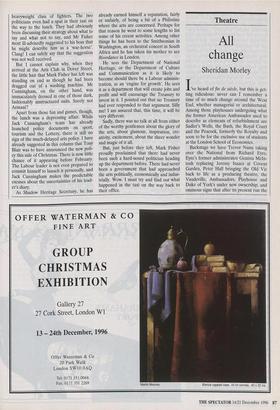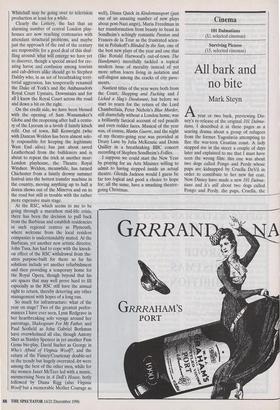Theatre
All change
Sheridan Morley
I've heard of fin de siècle, but this is get- ting ridiculous: never can I remember a time of so much change around the West End, whether managerial or architectural. Among those playhouses undergoing what the former American Ambassador used to describe as elements of refurbishment are Sadler's Wells, the Bush, the Royal Court and the Peacock, formerly the Royalty and soon to be for the exclusive use of students at the London School of Economics.
Backstage we have Trevor Nunn taking over the National from Richard Eyre, Eyre's former administrator Genista McIn- tosh replacing Jeremy Isaacs at Covent Garden, Peter Hall bringing the Old Vic back to life as a producing theatre, the Vaudeville, Ambassadors, Playhouse and Duke of York's under new ownership, and ominous signs that after its present run the Whitehall may be going over to television production at least for a while.
Clearly the Lottery, the fact that an alarming number of central London play- houses are now reaching centenaries with attendant structural problems, and maybe just the approach of the end of the century are responsible for a good deal of this shuf- fling around: what will emerge we have yet to discover, though a special award for cre- ating havoc and confusion among tourists and cab-drivers alike should go to Stephen Daldty who, in an act of breathtaking terri- torial aggression, has temporarily renamed the Duke of York's and the Ambassadors Royal Court Upstairs, Downstairs and for all I know the Royal Court across the road and down a bit on the right.
On the credit side, we have been blessed with the opening of Sam Wanamaker's Globe and the reopening after half a centu- ry of the Lyceum in a lavish if faintly kitsch refit. Out of town, Bill Kenwright (who with Duncan Weldon has been almost sole- ly responsible for keeping the legitimate West End alive) has just about saved Leatherhead from the bulldozers and is about to repeat the trick at another near- London playhouse, the Theatre Royal Windsor. Weldon, meanwhile, has turned Chichester from a faintly drowsy summer festival into the hottest transfer machine in the country, moving anything up to half a dozen shows out of the Minerva and on to the road but still in trouble with the rather more expensive main stage.
At the RSC, which seems to me to be going through a marathon mid-life crisis, there has been the decision to pull back from the Barbican and establish residencies in such regional centres as Plymouth, where welcome from the local resident companies is understandably muted. At the Barbican, yet another new artistic director, John Tusa, has had to cope with the knock- on effect of the RSC withdrawal from the- atres purpose-built for them: so far his solutions include yet another refurbishment and then providing a temporary home for the Royal Opera, though beyond that his are spaces that may well prove hard to fill especially as the RSC still have the annual right to return, thereby deterring any other management with hopes of a long run.
So much for infrastructure: what of the year on stage? Two of the greatest perfor- mances I have ever seen, Lynn Redgrave in her heartbreaking solo voyage around her parentage, Shakespeare For My Father, and Paul Scofield as John Gabriel Borkman have overwhelmed all else, though Antony Sher as Stanley Spencer in yet another Pam Gems bio-play, David Suchet as George in Who's Afraid of Virginia Woolf?, and the return of the Finney/Courtenay double-act in the trendy but hugely overrated Art were among the best of the other men, while for the women Janet McTeer led with a manic, mesmerising Nora in A Doll's House, hotly followed by Diana Rigg (also Virginia Woolf but a memorable Mother Courage as well), Diana Quick in Kindertransport (just one of an amazing number of new plays about post-Nazi angst), Maria Freedman in her transformation from beauty to beast in Sondheim's achingly romantic Passion and Frances de la Tour as the frustrated scien- tist in Poliakoffs Blinded by the Sun, one of the best new plays of the year and one that (like Ronald Harwood's out-of-town The Handyman) mercifully tackled a topical modern issue of morality instead of yet more urban losers living in isolation and self-disgust among the cracks of city pave- ments.
Nastiest titles of the year were both from the Court, Shopping and Fucking and I Licked a Slag's Deodorant, but before we start to yearn for the return of the Lord Chamberlain, Peter Nichols's Blue Murder, still shamefully without a London home, was a brilliantly farcical account of red pencils and even redder faces. Musical of the year was, of course, Martin Guerre, and the night of my theatre-going year was provided at Drury Lane by Julia McKenzie and Denis Quilley in a breathtaking BBC concert recording of Stephen Sondheim's Follies.
I suppose we could start the New Year by praying for an Arts Minister willing to admit to having stepped inside an actual theatre. Glenda Jackson would I guess be far too logical and good a choice to hope for; all the same, have a smashing theatre- going Christmas.



















































































































 Previous page
Previous page